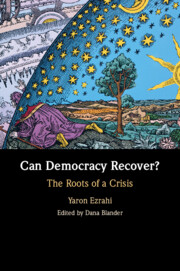Book contents
- Can Democracy Recover?
- Can Democracy Recover?
- Copyright page
- Dedication
- Contents
- Preface
- Words from the Author
- Introduction
- Part I The Rise of Western Politics following the Collapse of the Monistic Medieval Cosmology
- 1 Nature as the Transcendental Imaginary of Modern Secular Society
- 2 The Rise of the Western Nature/Culture Dualistic Cosmology from a Comparative Perspective
- 3 Risks and Opportunities Inherent in the Unstable Demarcation Lines between Nature and Culture
- Part II The Emergence of the Epistemological Constitution of Modern Democracy
- Part III The Dialectics of Objectification
- Part IV The Erosion of the Epistemological Constitution of Modern Democracy
- Part V Democracy beyond Modernity
- Can Democracy Recover? Concluding Reflections
- Epilogue
- Index
2 - The Rise of the Western Nature/Culture Dualistic Cosmology from a Comparative Perspective
from Part I - The Rise of Western Politics following the Collapse of the Monistic Medieval Cosmology
Published online by Cambridge University Press: 02 January 2025
- Can Democracy Recover?
- Can Democracy Recover?
- Copyright page
- Dedication
- Contents
- Preface
- Words from the Author
- Introduction
- Part I The Rise of Western Politics following the Collapse of the Monistic Medieval Cosmology
- 1 Nature as the Transcendental Imaginary of Modern Secular Society
- 2 The Rise of the Western Nature/Culture Dualistic Cosmology from a Comparative Perspective
- 3 Risks and Opportunities Inherent in the Unstable Demarcation Lines between Nature and Culture
- Part II The Emergence of the Epistemological Constitution of Modern Democracy
- Part III The Dialectics of Objectification
- Part IV The Erosion of the Epistemological Constitution of Modern Democracy
- Part V Democracy beyond Modernity
- Can Democracy Recover? Concluding Reflections
- Epilogue
- Index
Summary
This chapter explains how the distinction between physical and metaphysical cosmologies contributed to the rise of modern democracy. Ezrahi argues that the division of Nature from God and Culture has created a space for human agency and democratic practices. This dichotomy has also facilitated the alliance between science and democracy, with science gaining authority in representing Nature in relation to societal norms. The text further discusses the imposition of Western cosmologies on non-Western societies under the guise of modernization. It references the work of anthropologist Philippe Descola, who categorizes cosmologies based on configurations of physicalities and interiorities, identifying four types: totemism, analogism, animism, and naturalism. The chapter also explores how these different cosmologies manifest in various societies globally. It emphasizes the transformative impact of modern science on societal beliefs and commonsense, highlighting the role of encyclopedias and dictionaries in this transformation process. The global influence of Western science and technology is also discussed, particularly their perceived neutrality and universality. It also notes how different cosmologies often borrow elements from each other, often stripped of their original context. Lastly, it touches upon the presence of animism in Western childhood culture.
- Type
- Chapter
- Information
- Can Democracy Recover?The Roots of a Crisis, pp. 21 - 30Publisher: Cambridge University PressPrint publication year: 2025

